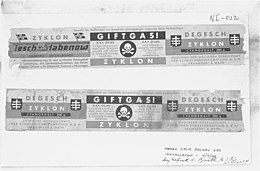
Back Deutsche Gesellschaft für Schädlingsbekämpfung German Deutsche Gesellschaft für Schädlingsbekämpfung French Degesch Italian デゲッシュ (企業) Japanese Degesch Dutch Deutsche Gesellschaft für Schädlingsbekämpfung Polish Degesch Swedish

The Deutsche Gesellschaft für Schädlingsbekämpfung mbH (transl. German Corporation for Pest Control), oft shortened to Degesch, was a German chemical corporation which manufactured pesticides. Degesch held the patent on the infamous pesticide Zyklon, a variant of which was used to execute people in the gas chambers of German extermination camps during the Holocaust. Through the firms Tesch & Stabenow GmbH (Testa) and Heerdt-Linger (Heli), Degesch sold the poisonous gas Zyklon B to the German Army and the Schutzstaffel (SS).
Degesch was founded in 1919 as a subsidiary of Degussa.[1] Its first director was Nobel laureate Fritz Haber. In 1936, Degussa and IG Farben each held 42.5% of the shares, while Th. Goldschmidt AG held the remaining 15%. During the years 1938 through 1943, Degesch was extremely profitable. For most of these years, IG Farben received dividends amounting to twice the value of their shares.[2] After the Second World War Degesch continued production. In 1986, the company was sold to Detia Freyberg GmbH; the current name is Detia-Degesch GmbH.
- ^ "Wie die Kultur einbrach : Giftgas und Wissenschaftsethos im Ersten Weltkrieg" (PDF).
- ^ Hilberg, Raul (2003). The Destruction of the European Jews (3rd ed.). New Haven, CT: Yale University Press. p. 952. ISBN 9780300095579.